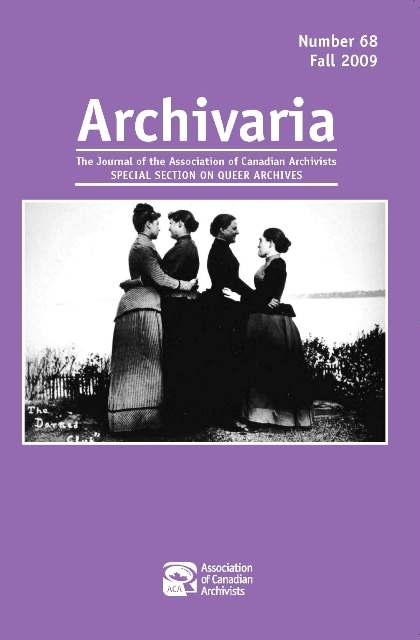Resisted Access? National Security, the <i>Access to Information Act</i>, and Queer(ing) Archives
Résumé
The anti-homosexual security purges organized by the Security Panel and enforced by the RCMP, represent a sad chapter in Canadian Cold War history. This essay offers some of the author’s experiences as she negotiated the “maze” of classified documents, archives, and historical records held at government departments while researching her book The Canadian War on Queers: National Security as Sexual Regulation, co-authored with Gary Kinsman. The author contends that the national security state can deploy the Access to Information Act (ATI) to create challenges and obstacles for queer historians in their effort to find queers in – or to queer – the archives. The essay also speculates that in the context of the “war on terror,” the AntiTerrorism Act (ATA) will reinforce the negative impact of ATI and thus have detrimental implications for the writing of queer history.
RÉSUMÉ
Les purges de sécurité anti-homosexuelles organisées par le Security Panel et imposées par la GRC, constituent un triste chapitre dans l’histoire canadienne de la Guerre froide. Ce texte raconte certaines expériences de l’auteure alors qu’elle a traversé un « labyrinthe » de documents classifiés, de documents d’archives et de documents historiques conservés dans des ministères pendant qu’elle faisait de la recherche pour le livre The Canadian War on Queers: National Security as Sexual Regulation, qu’elle a écrit avec Gary Kinsman. L’auteure soutient que l’État de sécurité nationale peut se servir de la Loi sur l’accès à l’information (AI) pour créer des défis et des obstacles pour les historiens des minorités sexuelles qui sont à la recherche de contenu gai et lesbien dans les archives. Le texte avance aussi l’hypothèse que dans le contexte de la « Guerre contre la terreur », la Loi antiterroriste renforcera l’impact négatif de l’AI, ce qui aura des répercussions nuisibles pour la rédaction de l’histoire gaie et lesbienne.
Authors of manuscripts accepted for publication retain copyright in their work. They are required to sign the Agreement on Authors' Rights and Responsibilities that permits Archivaria to publish and disseminate the work in print and electronically. In the same agreement, authors are required to confirm that "the material submitted for publication in Archivaria, both in its paper and electronic versions, including reproductions of other works (e.g. photographs, maps, etc.) does not infringe upon any existing copyright." Authors of manuscripts accepted for publication retain copyright in their work and are able to publish their articles in institutional repositories or elsewhere as long as the piece is posted after its original appearance on archivaria.ca. Any reproduction within one year following the date of this agreement requires the permission of the General Editor.





